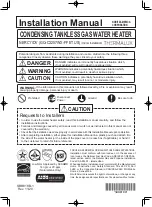
WARNING
NOTE
28
mrcool.com
Connecting the Condensate Drain
Connecting the Condensate Drain
1.
2.
3.
4.
• If you are using a condensate pump, ensure that the
pump allows for up to 2 GPH of drainage for each
water heater in the system.
• If you are not using a condensate pump, ensure that
the drain line is pitched downward at a minimum
slope of 1/4 in per foot.
The condensate line must remain unobstructed,
allowing for the free flow of condensate. If condensate
freezes in the line, or if the line is obstructed in any
other manner, condensate can exit from the tee,
resulting in potential water damage.
Fig 12.3
Fig 12.2
Condensate
Drain
Condensate Neutralizer Kit
DO NOT
allow exhaust flue gases to vent through
the neutralizer. Leakage can cause injury or death
from carbon monoxide.
DO NOT
connect more than one appliance to
the neutralizer.
• To avoid damaging the appliance, the neutralizer
inlet and discharge must be lower than the
condensate drain.
• The connection between the appliance and the
neutralizer must be installed to prevent the back
flow of condensate into the appliance.
Locate the condensate drain on the bottom of the water
heater and remove the drain cap.
(See Fig. 12.2)
Connect a drain line to the 1/2 in. fitting at the bottom of
the unit.
NOTE: Use only corrosion-resistant material
for the drain line, such as PVC or CPVC.
DO NOT
reduce the size of this fitting or the drain
line to less than 1/2 in.
Place the free end of the drain line into an appropriate
drain.
Fill the condensate trap inside the water heater by pouring
water through the exhaust vent on top of the unit until
water flows through the condensate drain. Ensure the
water flows through the condensate drain line smoothly.
(See Fig. 12.3)
Front view
Condensate trap
Bottom view
















































